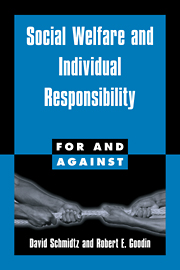Book contents
- Frontmatter
- Contents
- Series Editor's Introduction
- Preface
- 1 Taking Responsibility
- 2 Social Welfare as a Collective Social Responsibility
- 2.1 The Policy Context
- 2.2 Some Key Words in Context
- 2.3 Collective Responsibility
- 2.4 The Classic Case for Collectivization Restated
- 2.5 The Morality of Incentives and Deterrence
- 2.6 The Point of Politics
- References
- Index
2.3 - Collective Responsibility
Published online by Cambridge University Press: 05 June 2012
- Frontmatter
- Contents
- Series Editor's Introduction
- Preface
- 1 Taking Responsibility
- 2 Social Welfare as a Collective Social Responsibility
- 2.1 The Policy Context
- 2.2 Some Key Words in Context
- 2.3 Collective Responsibility
- 2.4 The Classic Case for Collectivization Restated
- 2.5 The Morality of Incentives and Deterrence
- 2.6 The Point of Politics
- References
- Index
Summary
Having completed my negative case against the current campaigns for “personal responsibility for welfare,” I now turn to my more positive arguments for the alternative, “collective responsibility for welfare.” In defining my own key terms, first I focus on the notion of “collective,” carefully differentiating the sense of collectivism I shall be defending from other senses from which I want to distance myself. Next I discuss two notions of “responsibility,” identifying clearly the one I think ought guide public policy and again differentiating it sharply from the one that is so often (mis)used in arguments for personal responsibility for welfare.
Alternative Kinds of Collectivism
A great many collectivist claims about human welfare seem to me to be simply untenable. Let me disassociate myself from the start from those more mystical, or more brutal, forms of collectivism.
Society, in my view, is made up of individual human beings and, significantly, interactions and interrelationships among them. “Welfare” is an attribute enjoyed by those natural individuals and, ultimately, by them alone. The welfare of society as a whole is nothing more than the aggregate of the well-being enjoyed by those individuals. They may, and typically do, derive much of their well-being from interactions with other individuals. (Adam Smith admits as much.) But in the final analysis well-being or welfare is just the well-being or welfare of those individuals, taken together. There is no entity called “society” that stands above those individuals and enjoys any welfare of its own.
- Type
- Chapter
- Information
- Social Welfare and Individual Responsibility , pp. 145 - 154Publisher: Cambridge University PressPrint publication year: 1998



